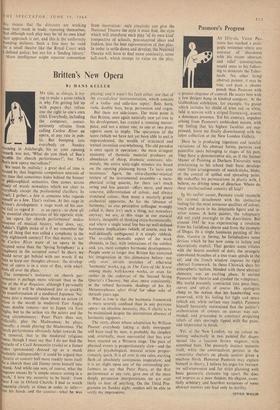Britten's New Opera
By HANS KELLAR
My title, as always, is try- ing to make a point (which is why I'm getting fed up with papers that refuse one the right to one's own title). Everybody, including the composer, consci- entiously refrains from calling Curlew River an opera, at any rate in pub- lic. But bumping into MUM everybody on Sunday morning in Aldeburgh, his or your opening /titlark was not, 'What do you think of Ben's parable fbr church performance?', but 'Isn't Ben's new opera marvellous?'
We must be realistic: a great deal of time is Wasted by that linguistic compulsion neurosis of Our time that sometimes hides behind the banner or philosophical semantics. One conies across Plenty of words nowadays which are clear to 4erybody except the professional clarifiers. In /vac], I gather, a Jew is someone who regards himself as a Jew. That's realism. At this stage in ilritten's development. a stage work of his can- not fail to regard it, as an opera—to show all the essential characteristics of his operatic style. If 'an opera for church .performance' makes nonsense of musical history, what does, say, 'Iahler's Eighth make of it if we remember the Kind of thing that was called a symphony. in the early eighteenth century? For that matter, is not the Curlew River more of an opera in the eeepted sense than the 'Spring Symphony' is a symphony in the accepted sense? In short, we 'should never get behind with our words if we kant to keep our thoughts abreast : the develop- /went of opera is in a state of Mix, with whirl- Pools all over the place.
The composer's insistence on church per- Wmance is perhaps more relevant than in the se of the War Requiem, although I personally n that it will be abandoned just as quickly. the transformation of a mediaevel Japanese 'No' grama into a monastic show about an action (if tenon is the word) in medieval East Anglia means double remove—not to Japan via East quglia, but to the action via the actors and the feting circumstances: • Peter Pears does • not, artificially, play the Madwoman; he plays, 'naturally, a monk ,playing the Madwoman. The ,hurch performance obviously helps towards the 'rst removal, that to the mediaeval religious rama, though. I must say that I do not find the 'lades of a Cecil Aronowitz (viola) or a James 5/ades (percussion) dressed up as a monk absolutely indispensable: it could be argued that theatre or concert hall more readily turns itself Into a church than old Jimmy turns himself into
And while one sees, of course, what the
10tnposer means by 'a simple austere setting in a 1/lurch,' I love my austerity to be lucid: from here I sat in Orford Church, I had to, watch ronowitz closely at times in order to infer- om his hands and the context—what he was
playing; and it wasn't his fault either, nor that of the crystal-clear instrumentation, which consists of a violin- and cello-less septet: flute, horn, viola, double bass, harp, percussion and organ.
But these are side-issues. The main point is that Britten, once again naturally new yet true to ,his development, has created a stunning master-• piece, and not a minor one, as one or two press reports seem to imply. The sparseness of the score (which we have not yet been able to see) is unprecedented, the wealth of structural and textual invention overwhelming. The old paradox is once again in operation: the most stringent economy of thematic material produces an abundance of sharp, dramatic contrasts; ulti- mately, the entire sixty-eight minutes are based on the opening plainsong hymn `Te Weis ante terminum.' Again, the ultra-chamber-musical texture of the instrumental ensemble=a meta- phorical string quartet, for there isn't much string and less quartet—offers more, and more concrete, differentiation of colour, and always structural colour,. than many a masterly grand orchestral apparatus. As for the 'absence of harmony,' as one perceptive colleague wrongly called it, there isn't such a thing, not nowadays anyway; we are, at -this stage in our musical history, incapable of thinking extra-harmonically, and where a single tonal line has no well-defined harmonic implications (which, of course, may be well-delinedly ambiguous) it is simply rubbish. The so-called monodic aspect of the work abounds, in fact, with intimations of the subtlest and, yes, most complex harmonic developments. People seem to forget that Britten has exercised his imagination in this .dimension before—not only over certain stretches . of otherwise 'harmonic' works, e.g. in 71,e Turn of the Screw, among many well-known works, or even far earlier in the cadenzas of the Second . String Quartet's Chacony, but also, more consistently, in the relined harmonic shadings of his Six Metamorphoses after Ovid for •oboe- solo of
thirteeh years ago. •
What is true is that the harmonic framework is more severely confined than in any previous opera—an absolute necessity, this, if clarity is to be maintained despite the intermittent absence of barn-ionic signposts..
The story, about whose adaptation by William Plomer everybody taking a daily newspaper will have read by now, is probably the simplest arid, externally, most uneventful that has ever been enacted on a Western stage. The pace of physical events is proportionately slow—and the pace of psychological, Musical action propor- tionately quick. It is all over in one calm, exciting' flash,.of absolutely continuous inspiration; and it is no slight, Upon any of the outstanding per- formers to say that Peter Pears, at the first performance at any rate, gave one of the most deeply persuasive interpretations we are ever likely to hear of anything. On the Third Pro- gramme on Sunday night, readers will be able to verify my impressions.






























 Previous page
Previous page